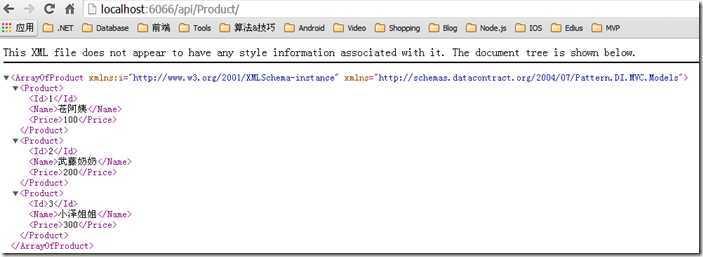ASP.NET Web API中的依赖注入
2020-11-25 02:39
标签:des style blog class code c
依赖,就是一个对象需要的另一个对象,比如说,这是我们通常定义的一个用来处理数据访问的存储,让我们用一个例子来解释,首先,定义一个领域模型如下: 然后是一个用于实例的简单存储类: public class ProductRepository public Product GetById(int id) 现在,我们定义一个ASP.NET Web API控制器来支持对Product实体集的GET请求: public IEnumerable public Product Get(int id) 现在注意到,这个控制器依赖了“ProductRepository”这个类,我们在类中实例化了ProductRepository,这就是设计的“坏味道”了,因为如下几个原因: 我们可以使用注入一个ProductRepsoitory来解决这个问题,首先重构ProductRepository的方法到一个接口中: public interface IProductRepository public Product GetById(int id) public IEnumerable public Product Get(int id) 这个示例使用了构造器注入,你同样可以使用设置器注入的方式,ASP.NET Web
API在为请求映射了路由之后创建控制器,而且现在他不知道任何关于IProductRepository的细节,这是通过API依赖器解析到的。 ASP.NET Web API定义了一个IDependencyResolever用来解析依赖项目,以下是这个接口的定义: public interface IDependencyScope : IDisposable 这个接口有两个方法 这个接口继承自IDependencyScope并且添加了BeginScope方法,在这篇文章接下来将讨论这个方法。 当ASP.NET Web
API创建一个controller实例的时候,它首先调用IDependencyResolver的GetService方法,传回一个Controller实例,你可以使用一个扩展的钩子去创建控制器并且解析依赖。假如GetService方法返回NULL,ASP.NET
Web API将查找一个无参的构造函数。 虽然你可以重头开始写一个IDenpendencyResolver的实现,但是这个接口已经设计了可以作为ASP.NET Web
API和IoC工具的桥梁。 IoC容器是一个用来管理依赖项目的组建,你可以在其中注册类型,在使用的时候创建对象,IoC容易自动解析出依赖的关系,许多IoC容器允许你在对象的生命周期中进行控制。 首先在项目中使用NuGet Package Manage Console安装Unity,关于Unity的介绍可以点击这里查看详细。 以下是一个使用Unity容器对IDependencyResolver的实现: namespace Pattern.DI.MVC.Models public UnityResolver(IUnityContainer container) public object GetService(Type serviceType) public IEnumerableobject> GetServices(Type serviceType) public IDependencyScope BeginScope() public void Dispose() 在全局的HttpConfiguration对象中DependencyResolver属性上设置依赖解析器,以下的代码使用Unity注册IProductRepository接口并且创建一个UnityResolver,修改App_Start/WebApiConfig.cs中的Register方法 config.Routes.MapHttpRoute( 至此完工,测试Api返回数据 ASP.NET Web API中的依赖注入,搜素材,soscw.com ASP.NET Web API中的依赖注入 标签:des style blog class code c 原文地址:http://www.cnblogs.com/lyl6796910/p/3721951.html什么是依赖注入
namespace Pattern.DI.MVC.Models
{
public class Product
{
public int Id { get; set; }
public string Name { get; set; }
public decimal Price { get; set; }
}
}namespace Pattern.DI.MVC.Models
{
public class ProductContext
{
public List
public ProductContext()
{
Products.Add(new Product() {Id = 1, Name = "苍阿姨", Price = 100});
Products.Add(new Product() {Id = 2, Name = "武藤奶奶", Price = 200});
Products.Add(new Product() {Id = 3, Name = "小泽姐姐", Price = 300});
}
}
{
private ProductContext context=new ProductContext();
public IEnumerable
{
return context.Products;
}
{
return context.Products.FirstOrDefault(p => p.Id == id);
}
}
}namespace Pattern.DI.MVC.Controllers
{
public class ProductController : ApiController
{
private readonly ProductRepository productRepository=new ProductRepository();
{
return productRepository.GetAll();
}
{
return productRepository.GetById(id);
}
}
}
namespace Pattern.DI.MVC.Models
{
{
IEnumerable
Product GetById(int id);
}
public class ProductRepository:IProductRepository
{
private ProductContext context = new ProductContext();
public IEnumerable
{
return context.Products;
}
{
return context.Products.FirstOrDefault(p => p.Id == id);
}
}
}namespace Pattern.DI.MVC.Controllers
{
public class ProductController : ApiController
{
private readonly IProductRepository productRepository;
public ProductController(IProductRepository productRepository)
{
this.productRepository = productRepository;
}
{
return productRepository.GetAll();
}
{
return productRepository.GetById(id);
}
}
}ASP.NET Web API依赖解析器
public interface IDependencyResolver : IDependencyScope, IDisposable
{
IDependencyScope BeginScope();
}
{
object GetService(Type serviceType);
IEnumerableobject> GetServices(Type serviceType);
}
使用Unity解析依赖
Install-Package Unity
using System;
using System.Collections.Generic;
using System.Linq;
using System.Web;
using Microsoft.Practices.Unity;
using System.Web.Http.Dependencies;
{
public class UnityResolver : IDependencyResolver
{
protected IUnityContainer container;
{
if (container == null)
{
throw new ArgumentNullException("container");
}
this.container = container;
}
{
try
{
return container.Resolve(serviceType);
}
catch (ResolutionFailedException)
{
return null;
}
}
{
try
{
return container.ResolveAll(serviceType);
}
catch (ResolutionFailedException)
{
return new Listobject>();
}
}
{
var child = container.CreateChildContainer();
return new UnityResolver(child);
}
{
container.Dispose();
}
}
}配置依赖解析
namespace Pattern.DI.MVC
{
public static class WebApiConfig
{
public static void Register(HttpConfiguration config)
{
var container = new UnityContainer();
container.RegisterType
config.DependencyResolver = new UnityResolver(container);
name: "DefaultApi",
routeTemplate: "api/{controller}/{id}",
defaults: new { id = RouteParameter.Optional }
);
}
}
}

文章标题:ASP.NET Web API中的依赖注入
文章链接:http://soscw.com/index.php/essay/22547.html